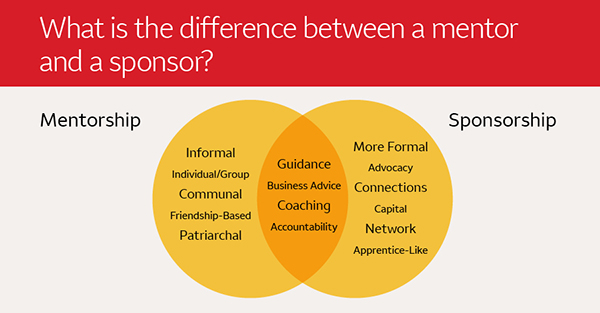Gaining access to mentors and other important resources can benefit your diverse-owned business.
More than 70% of Fortune 500 companies offer their employees some form of mentoring program, according to the Harvard Business Review.1 But small diverse-owned businesses often lack access to a professional network that can offer advice and connect these businesses to crucial resources like capital.
For this reason, it’s smart for diverse small businesses to pursue small business sponsorships and mentorships. Sponsors and mentors are similar, but slightly different relationships; both can help business owners.
Whether you’re a business enterprise seeking guidance or in a position to provide it, here are some tips on how to expand your network through these relationships. Networks can be a catalyst for beneficial business partnerships and access to capital, ultimately helping business owners build financial resilience.

What is the difference between a mentor and a sponsor?
Mentorship centers around guidance such as coaching, goal setting, or accountability. Sponsorship includes mentorship plus resources like access to capital, key relationships, and influence to support key business endeavors.2
What does an ideal mentorship relationship look like?
There are no hard and fast rules when it comes to mentorship. Providing advice, guidance, and goal setting is a great start. An ideal mentor is a seasoned professional or senior leader in your industry who has had career success and wants to pass on what they’ve learned. Mentors with special expertise can provide insight on critical topics like taxation, raising capital, scaling, marketing, technology, and more.
![]()
Tip: Use your mentor wisely
Try to work with a mentor who understands your challenges as a diverse business owner:
-
- Focus on areas of your business that need the most attention
- Assess how much support and time your mentor can provide
- Think about how often or where meetings can take place
What does an ideal sponsorship relationship look like?
Sponsorship is very much like a mentorship with added benefits. Sponsors may also provide capital, help with credentials like certifications, advocate on your behalf, or provide connections. These resources can be a catalyst for businesses to reach financial and growth milestones much faster than they would without a sponsor. Traditional sponsorship typically involves money in exchange for promotion. Sponsorships are not easy to find, but can come from many sources, including larger competitors, vendors, clients, or anyone willing to vouch for you.
How can diverse business owners find a sponsor or mentor?
Start with your personal network and reach out. Next, attend networking events in your industry. This could include conferences, Facebook groups, or mastermind cohorts. You might also check out industry forums, local community groups, or your church or other religious organization (if that’s a part of your network), and connect with established professionals on social media as appropriate. Learn more about how professional organizations can help your small business.
Another valuable resource is your local SCORE branch, which has mentorship opportunities specifically for Black, Latino, and Asian American business owners. Large corporations sometimes host formal mentorship and sponsorship programs and post updated information about these efforts on their websites. These programs may be part of supplier diversity programs.
![]()
Tip: Boost your online presence
As you do outreach, make sure that you’ve got a public-facing profile, such as on LinkedIn, so your contacts have something to reference. When you broadcast your businesses’ activities, you are letting potential sponsors know that you are already active in your industry, which might inspire them to help you.
Make the ask
Once you find a potential sponsor or mentor, make the ask. For mentorships, it’s important to form a relationship first. If you’re discussing a sponsorship and money or something else of value will be exchanged, create written documentation such as a promissory note or assignment of shares when exchanging equity for capital.
Keep at it. Expanding your network takes time. Suppliers, customers, consultants, or brand ambassadors are all places to look. No matter the arrangement, perform on the deliverables, and pay it forward to other diverse small business owners when you can. Discover the advantages of working with other diverse-owned businesses and creating diverse partnerships.
The good news is that both mentorship and sponsorship arrangements can advance the diverse business owner community as whole. No matter which side of the relationship you fall on, these mutually beneficial opportunities can support lasting business growth.
In addition to tapping into mentors and sponsors, make an appointment with a banker for insights to help your small business succeed and take advantage of products and services that are tailored to your business needs.
1. Harvard Business Review, Why Your Mentoring Program Should Be Mandatory
2. Time, How to Find a Sponsor to Boost Your Career





